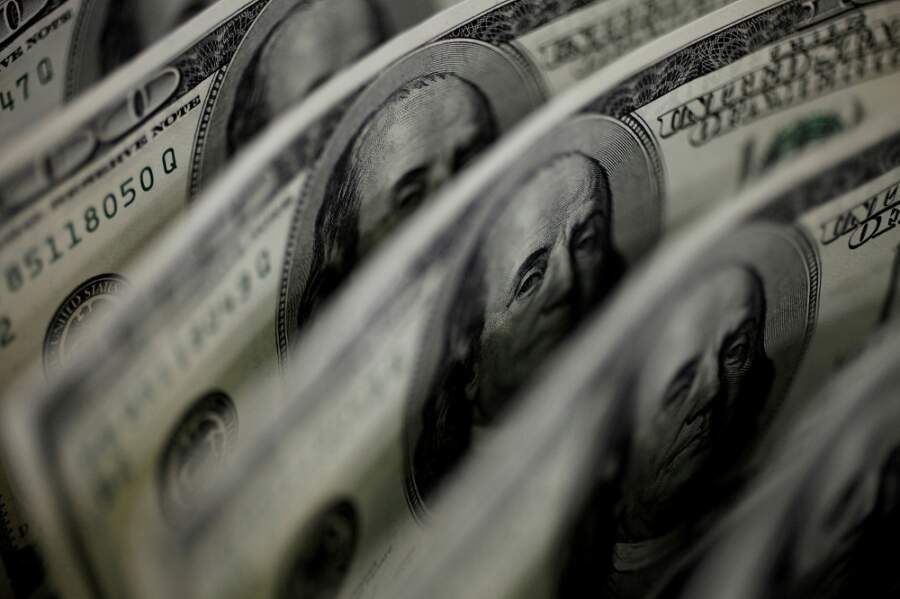
By Gertrude Chavez-Dreyfuss and Laura Matthews
NEW YORK (Reuters) – The U.S. dollar held gains against a basket of currencies on Thursday, bolstered by stronger-than-expected producer prices and falling jobless claims, hinting that the Federal Reserve would have to maintain its inflation-fighting interest rate hikes for longer.
Earlier, the dollar index hit six-week highs, rising to six-week peaks as well against the yen, euro, and Australian dollar. By afternoon trading, the dollar pulled back and traded within narrow ranges.
The U.S. producer price index bounced to 0.7% in January, after declining 0.2% in December. Meanwhile, jobless claims unexpectedly fell to 194,000, compared to the 200,000 claims expected, according to a Reuters poll.
“The strong PPI data and hawkish speak from Cleveland Fed President (Loretta) Mester have raised rate expectations further and this is keying the dollar’s upward move today,” said John Velis, FX and macro strategist at BNY Mellon Markets in New York.
Mester said in a speech that the Fed “has come an appreciable way in bringing policy from a very accommodative stance to a restrictive one, but I believe we have more work to do.”
BNY’s Velis said stronger labor market data and sticky inflation certainly solidified the “higher for longer” school of thought on rates.
In afternoon trading, the dollar index was up 0.2% at 103.93 , after earlier hitting a six-week high of 104.24. That said, it is still more than 11% above late September’s 20-year low.
Against the yen, the U.S. dollar also hit a six-week peak, but was last down 0.1 % at 133.94 . Yen traders are waiting for a speech by Kazuo Ueda, the nominee to become the Bank of Japan’s next governor, at a confirmation hearing at the lower house of parliament on Feb. 24.
The interest rate futures market shows U.S. rates could peak close to 5.25% by July before dropping to 5.0% by the end of the year.
Thursday’s data followed strong economic numbers on Tuesday and Wednesday.
Data from the U.S. Commerce Department showed on Wednesday that U.S. retail sales rebounded sharply in January after two-straight monthly declines.
That came just a day after U.S. inflation figures showed consumer prices slowing, but still sticky. Data from earlier this month also showed that U.S. job growth accelerated sharply in January, pointing to a resilient economy.
However, the question for market watchers is how well can the economy continue to hold up, especially as rates head much higher than many originally thought.
Sterling slid 0.5% to $1.1985, after having lost more than 1% on Wednesday.
British inflation slowed more than expected in January and there were signs that price pressures are cooling in parts of the economy, such as services, that the Bank of England (BoE) watches closely.
The BoE has already indicated that it may stop raising rates in March and Wednesday’s inflation data reinforced that view.
========================================================
Currency bid prices at 4:28PM (2128 GMT)
Description RIC Last U.S. Close Pct Change YTD Pct High Bid Low Bid
Previous Change
Session
Dollar index 103.9300 103.8000 +0.15% 0.425% +104.2400 +103.5200
Euro/Dollar $1.0671 $1.0688 -0.15% -0.40% +$1.0723 +$1.0655
Dollar/Yen 133.9450 134.1600 -0.16% +2.16% +134.4600 +133.6050
Euro/Yen 142.94 143.39 -0.31% +1.88% +143.4400 +142.8600
Dollar/Swiss 0.9257 0.9238 +0.24% +0.14% +0.9271 +0.9215
Sterling/Dollar $1.1984 $1.2038 -0.47% -0.92% +$1.2074 +$1.1966
Dollar/Canadian 1.3458 1.3396 +0.47% -0.66% +1.3479 +1.3359
Aussie/Dollar $0.6875 $0.6907 -0.46% +0.86% +$0.6936 +$0.6841
Euro/Swiss 0.9877 0.9873 +0.04% -0.18% +0.9886 +0.9866
Euro/Sterling 0.8901 0.8884 +0.19% +0.64% +0.8910 +0.8871
NZ $0.6253 $0.6281 -0.44% -1.52% +$0.6309 +$0.6233
Dollar/Dollar
Dollar/Norway 10.2580 10.2090 +0.22% +4.25% +10.3090 +10.1565
Euro/Norway 10.9491 10.9083 +0.37% +4.34% +10.9870 +10.8780
Dollar/Sweden 10.4476 10.4135 +0.13% +0.38% +10.4945 +10.3734
Euro/Sweden 11.1507 11.1364 +0.13% +0.01% +11.1851 +11.1192
(Reporting by Gertrude Chavez-Dreyfuss and Laura Matthews; Additional reporting by Amanda Cooper in London and Rae Wee in Singapore; Editing by Simon Cameron-Moore, Mark Potter, Sharon Singleton and Diane Craft)


